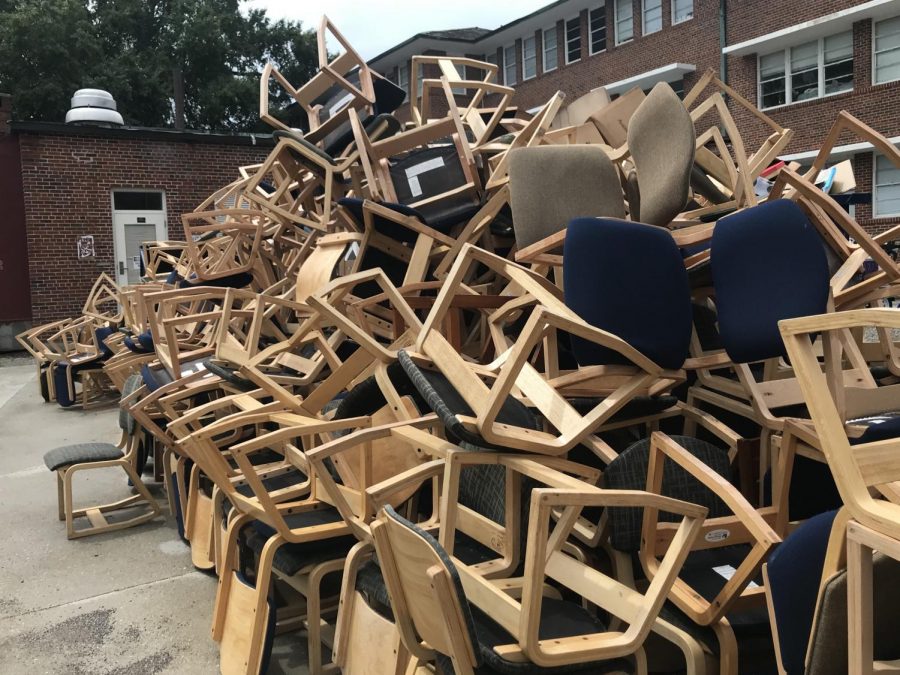OPINION | Want not, waste a lot: Tulane students need to check their privilege
Daisy Rymer | Production Manager
Tulane students have no trouble heedlessly discarding expensive items
September 23, 2020
Last spring, when the majority of the Tulane body evacuated due to COVID-19, the financial insensitivity of the student body was openly displayed around campus. Sophomores threw their lightly used futons, rugs and bedding off of the Phelps and Irby Residence Hall balconies into the dumpsters below. In their eyes, the hassle of finding someone willing to take it off their hands was far more difficult because they could just dump and then repurchase the item later on down the road. As students passed by the graveyard of perfectly suitable furniture, they remained unfazed by this exhibition of privilege.
In a city where almost 25% of the population lives in poverty, these seemingly useless items are a luxury. The same students who so haphazardly discarded their clutter are likely more than adequately educated on how they could have used them to benefit the community they rely on for both their education and their college experience. A simple post on the Tulane Classifieds or Facebook Marketplace offering up their belongings was apparently too much to ask during such “unprecedented times.”
The administration has continuously reminded students of the means through which they can volunteer in the New Orleans community. At the end of each school year, they allow students to donate unwanted goods to be recycled and reused by others in the community. Tulane prides itself on the Outreach Tulane program which boasts of providing students with the ability to give back to New Orleans. On top of that, students are required to complete two service learning courses prior to graduation. Yet, when New Orleans faced a global pandemic and the livelihoods of hundreds of Tulane employees were inherently threatened, this philanthropic rhetoric was nowhere to be found.
While it is partially understandable that in the chaos of evacuating campus, a process in which students were given over seven days notice of their duty to return home, they forgot their moral responsibility to those in need, this excuse neglects the recurrence of such overt acts of privilege since returning to campus. In particular, the neverending satire revolving around hurricane provisions is incredibly troubling.
Prior to Tropical Storm Marco and Hurricane Laura, Sodexo employees worked tirelessly to pack hurricane provisions for on-campus students. In these brown paper bags were an entire loaf of bread, peanut butter and an assortment of other nonperishable food goods meant to last students at least 72 hours. Instead of thanking the staff members who took time to ensure the wellbeing of the student body while also having to prepare themselves for the storms, Tulane students uploaded TikToks of their meals voicing their annoyance with the non-gourmet food items.
Although many of these students may not realize the privilege such jokes exude, the underlying tone is unforgettable. Tulane students have access to more than enough drinking water and nonperishables in the case of an emergency but still feel entitled to more. In contrast, 23% of New Orleanians are food insecure. The same meals that Tulane students mock are items that almost a quarter of city residents cannot access on a regular basis.
Students participated in the same insensitive actions during Hurricane Sally and many on-campus students threw out their hurricane rations or simply left them to spoil in common areas or dorm rooms. Inside of the entryways of many residence halls, piles of unwanted, perfectly good food could be seen waiting to be taken.
Instead of providing students with outlets for donating the leftovers to local food banks or other organizations, the university was silent. At the same time, on-campus residents yet again refrained from researching possible solutions to their unwanted rations despite having access to such information.
As Tulane students continue to use New Orleans as their collegiate stomping grounds, they must stop and think about the privilege they hold simply by attending their university. The rose-colored glasses that tint Tulane’s campus with ignorance fail to show the vast insecurities present just a stone’s throw from the university. If students have the time to benefit from New Orleans, they have time to recognize their privilege and give back to the community they have decided to call home for four years.










Jfc • Sep 27, 2020 at 7:22 pm
There’s definitely a point to be made about Tulane students’ insane privilege but this is literally the most boring reach of a take I’ve heard in a long time… Why would people list furniture on craigslist or classifieds when they were explicitly told to see as few people as possible because of the *pandemic*? Not to mention that meeting up with a stranger to ~sell your rug~ would put you at risk of bringing corona home and into your parents’ house… Should I risk killing my parents to make $35 on classifieds, reselling my dorm room rug from ikea? Jfc
Way to take an incredibly stressful time for everyone in the literal world and use it to virtue-signal from your pulpit.. It’s clear that you want to be angry to validate that inner compulsion to see yourself as different and virtuous… Boring!
Also, girl. “tulane students forgot their moral responsibility to those in need” – lmfao. it was a couple thrown-away desk lamps outside of Aron, and it would have had little to no effect on structural poverty in New Orleans. Write better!
recycled articles • Sep 26, 2020 at 10:45 pm
hullabaloo writers love talking about how tulane students always use new orleans as their “stomping grounds” but i’m willing to bet that 90% of y’all aren’t even from here. it’s just another thing for y’all to be mad about and write these endless opinion articles on
Skeptical • Sep 25, 2020 at 11:10 am
I’m a new parent to Tulane and don’t know what happened last year when COVID hit and students were required to move off campus, but I ‘m quite skeptical about the truth of this article when the photo used is not “lightly used futons, rugs and bedding” but a photo of similar chairs which appear to be the chairs for desks that students have in their dorm rooms when they move in to campus. My son’s chair was broken when he moved in, so his had to be replaced. This looks more to me like old, broken desk chairs that the university probably discarded than any type of mass dumping by students. I know this is an opinion article, but please use factual photos with your opinions.
Emily • Sep 25, 2020 at 7:28 am
And the idea that they are privileged is still lost on them. Proof is in these comments. Really? It is stressful to move out with 7 days notice just because you don’t have a car, imagine how it must feel to not have a car or a home or food or healthcare or clothes. How would you actually survive in the real world if you had to endure real stressful situations? I certainly wouldn’t be inclined to hire any of these students to work for my company when their answer to this “stressful situation” was just to throw everything away and complain about. Really? You had anxiety because Goodwill wasn’t open? Really?! You couldn’t just place items on a curb (rather than destroy them by throwing them off balconies and into dumpsters). Yet, yet, YET– students across the country haven’t found it stressful to go to parties and sporting events and rush the Greek system. They haven’t felt stressed or anxiety going to bars and clubs. Nope, they felt stress when asked to think for themselves and do the right thing.
John Burke • Sep 25, 2020 at 6:32 am
So “Stephanie” writes that as a Tulane student she should be praised during the evacuation of school and for keeping up her grades during a stressful time??? Stephanie, sweetheart, soon you’ll be in the real world and boy are you gonna find out what real stress is. All that cash being spent on your Tulane education and you haven’t clued in a bit about the world around you?? Mom and Dad, or perhaps Sallie Mae, sure must be proud of your “critical thinking skills” which have yet to manifest.
JB
A&S Class of 1980
Anonymous • Sep 24, 2020 at 4:32 pm
I can personally attest that there was a successful effort in at least one residence hall to donate leftover rations.
Fact Check • Sep 24, 2020 at 11:10 am
“Instead of providing students with outlets for donating the leftovers to local food banks or other organizations, the university was silent.”
I personally participated in the CPS food drive that was advertised in an email that went out to the entire student body. I personally collected donations of left over hurricane rations from around campus. The only thing we didn’t accept was the bread. A different club collected the bread and brought it to homeless shelters.
stephanie • Sep 24, 2020 at 10:58 am
I think it is very easy to use the term privilege to mock and put down students at a private university. Move out was a time of stress and anxiety for these students. Most have no cars and were moving out without any help and were looking for hard to find storage and packing materials. I think if the writer of this article really was aware of what was going on at this time they would know that the local spots that normally took these items were not accepting them and the on campus trash to treasures was not open for that option either. Instead of demeaning these students of so called “privilege” how about praising them for moving trying times while keeping their grades up and doing the best they could.
Karen Redlich • Sep 24, 2020 at 8:58 am
Some students made tik toks but many thanked the workers that packed their hurricane supplies. Many students were grateful for what their received. Although the university may not have organized food drives for leftover supplies, I think we should acknowledge the efforts students made on their own to gather and distribute leftover food in the city after the storms. This article says “rather than and instead of”, which is not the case. There are students who demonstrated a lack of moral responsibility and there are also students who rose to the occasion.